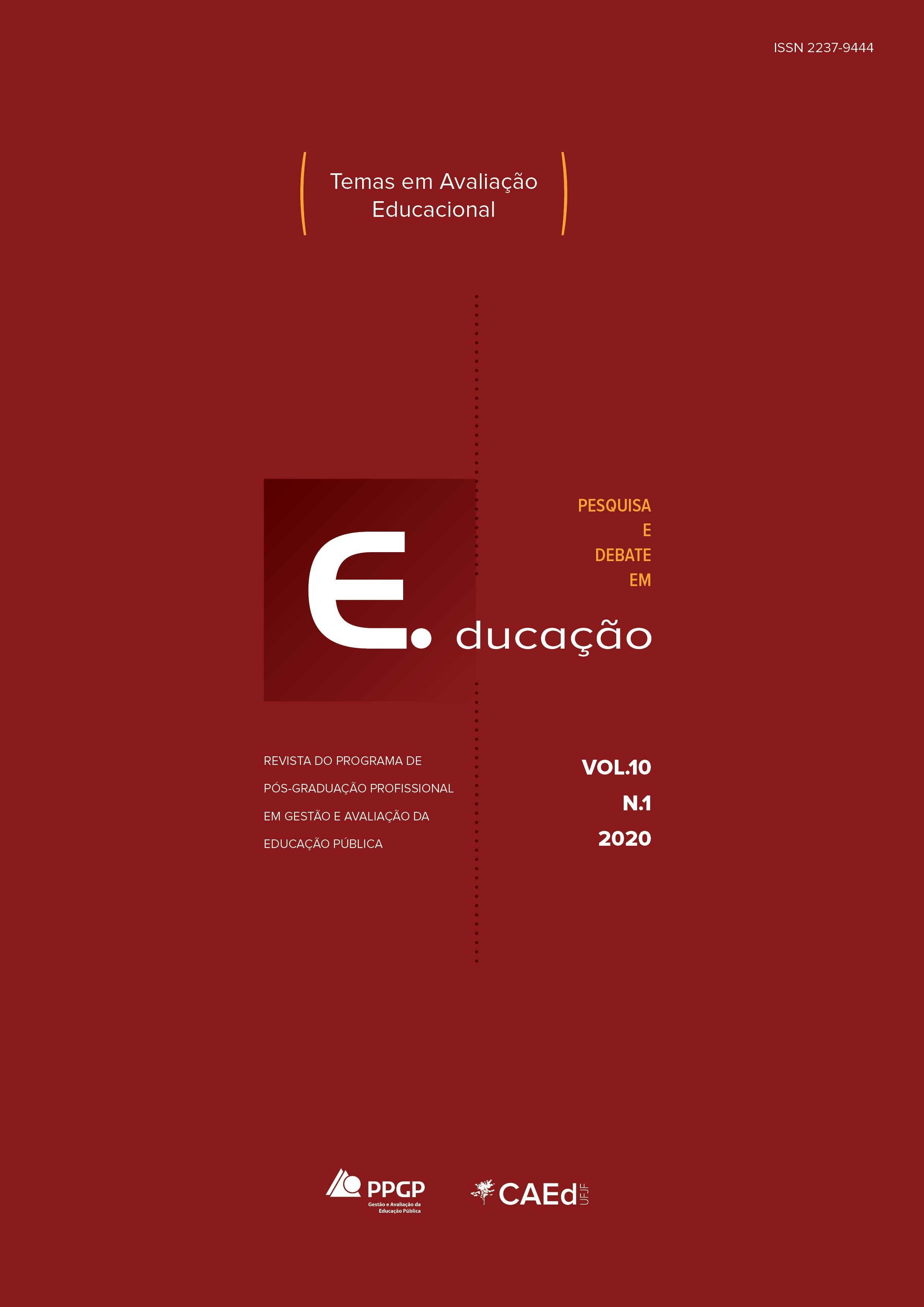Large-scale educational assessment and accountability
a brief analysis of the Brazilian experience
DOI:
https://doi.org/10.34019/2237-9444.2020.v10.32023Keywords:
Educational evaluation, Accountability, Basic education, SAEB, IDEBAbstract
This paper seeks to evaluate the large-scale educational assessment and accountability movement that has occurred in Brazil over the past two decades. In the article a brief review of the international literature on educational accountability is made, highlighting the arguments in its defense, the position of the critics and the evaluation of its results. This is followed by a review of the large-scale assessment and accountability movement in Brazil. At the end, an evaluation of this movement is conducted, addressing three issues: a) to what extent does the improvement of Brazilian educational data in fundamental education reflect an improvement in learning or reflect a “score inflation”? b) to what extent have evaluation and accountability programs contributed to this improvement? and c) why did the improvement in primary education not reach high school in the same way?
Downloads
References
AOS, S. PENNUCCI, A. K–12 Class Size Reductions and Student Outcomes: a Review of the Evidence and Benefit-Cost Analysis. Documento n. 13-01-2201, Washington State Institute for Public Policy, 2013.
BALLOU, D. Test Scaling and Value-Added Measurement. Education Finance and Policy, MIT Press, v. 4, n. 4, p. 351–383, 2009.
BAUER, A. et al. Iniciativas de avaliação do ensino fundamental em municípios brasileiros. Revista Brasileira de Educação, v. 22, n. 71, p. 1-19, out. 2017.
BEHRENDT, A.; EISENACH, J. JOHNSON, W. R. Selectivity Bias and the Determinants of SAT Scores. Economics of Education Review, 5 (4), p. 363-371, mês?? 1986.
BONAMINO, A.; FRANCO, C. Avaliação e Política Educacional: o Processo de Institucionalização do SAEB. Cadernos de Pesquisa, Rio de Janeiro, n. 108, p. 101-132, nov. 1999.
BOTELHO, F. B. et al. Sistemas de Accountability nas Escolas Públicas Brasileiras: Identificando a Eficácia das Diferentes Experiências. In: Fernandes, R., Souza, A. P. F., BOTELHO, F.; SCORZAFAVE, L. G. (orgs). Políticas públicas educacionais e desempenho escolar dos alunos da rede pública de ensino. Ribeirão Preto: FUNPEC-Editora, 2014, p. 59-80.
BROOKE, N. O futuro das políticas de responsabilização educacional no Brasil. Cadernos de Pesquisa. v. 36, n. 128, p. 377-401, maio./ago. 2006.
CASTRO, M. H. G. O Saeb e a Agenda de Reformas Educacionais: 1995- 2002. Em Aberto, Brasília, v. 29, n. 96, p 85-98, maio/ago. 2016.
CLARK, M.; ROTHSTEIN, J.; SCHANZENBACH, D. W. Selection Bias in College Admissions Test Scores. Economics of Education Review, Cambridge, n. 28, p. 295-307, aug. 2008.
COLEMAN, J. et al.; Equality of Educational Opportunity. Washington DC, 1966.
DYNARSKI, M. The Scholastic Aptitude Test: Participation and performance. Economics of Education Review, Elsevier, v. 6, n.3, p.263–273, jun. 1987.
DYNARSKI, M. GLEASON, P. Using Scholastic Aptitude Test Scores as indicators of state educational performance. Economics of Education Review, Elsevier, v. 12, n. 3, p. 203–211, jun. 1993.
FERNANDES, R. A universalização da avaliação e a criação do IDEB: pressupostos e perspectivas. Em Aberto, Brasília, v. 29, n. 96, mai./ago. 2016.
______. Índice de Desenvolvimento da Educação Básica (Ideb). Brasília: Inep, Textos para Discussão, Instituto Nacional de Estudos e Pesquisas Educacionais Anísio Teixeira, 26p., 2007.
FERNANDES, R. GREMAUD, A.. Qualidade da Educação: Avaliação, Indicadores e Metas. In: Veloso, F., Pessôa, S., Henriques, R. e Giambiagi, F. (orgs). Educação Básica no Brasil: construindo o país do futuro. Editora Campus/Elsevier, 2009, p. 213-238.
FIGLIO, D. LOEB, S. School Accountability. In Hanushek, E., Machin, S. e Woessmann, L. (Eds) Handbook of the Economics of Education, v. 3, North-Holland, 2011, p. 383-421.
FIRPO, S.; PIERI, R.;SOUZA, A. P.. Electoral Impacts of Uncovering Public School Quality: Evidence from Brazilian Municipalities. Revista Economia, v. 18, p. 1-17, 2017.
FLETCHER, P. R.; RIBEIRO, S. C. Modeling education system performance with demographic data: an introduction to the PROFLUXO model. Paris: Unesco, 1989.
GATTI, B. Avaliação educacional no Brasil: experiências, problemas, recomendações. estudos em avaliação educacional, Fundação Carlos Chagas, n.10, p. 67-80, 1994.
HANUSHEK, E. A. Grinding the antitesting ax: more bias than evidence behind NRC panel’s conclusions. Educational Next, v. 12, n. 2, p. 49-55, 2012.
HANUSHEK, E. A.; RAYMOND, M. Does school accountability lead to improved student performance? Journal of Policy Analysis & Management, v. 24, n. 2, p. 297-327, 2005.
HARBISON, R.W.; HANUSHEK, E. A. Educational performance of the poor. New York: Oxford University Press, 1992.
HORTA NETO, J. L. Um olhar retrospectivo sobre a avaliação externa no Brasil: das primeiras medições em educação até o SAEB de 2005. Revista Ibero Americana de Educacion, Brasília, v. 42. n. 5, p 1 -13, abr. 2007.
HOUT, M.; ELLIOTT, S. W. Incentives and test-based accountability in education. National Research Council of National Academies. Washington, DC: The National Academies Press, 2011.
KANE, T.; STAIGER, D. The promise and pitfalls of using imprecise school accountability measures. Journal of Economic Perspectives, v.16, n. 4, p. 91–114, fall 2002.
KLEIN, R.; RIBEIRO, S. C O Censo Educacional e o Modelo de Fluxo: o problema da repetência. Revista Brasileira de Estatística, v. 52, n. 197-198, p. 5-45, nov. 1991.
PEÑA, P. A. Impact of extension of elementary education in Brazil on test scores. Estudo realizado para o programa Todos pela Educação, 2014. Disponível em: http://www.todospelaeducacao.org.br/biblioteca/1524/impact-of-elementary-school-extension-on-test-scores/. Acesso em: 1 de novembro de 2019
PESTANA, M. I. Trajetória do SAEB: criação, amadurecimento e desafios. Em Aberto, Brasília, v. 29, n. 96, p. 71-84, mai./ago/, 2016.
REARDON, S. F. RAUDENBUSH, S. W. Assumptions of value-added models for estimating school effects. Education Finance and Policy, v. 4, n. 4, p. 492-519, 2009.
ROCHA, R.; KOMATSU, B.; MENEZES-FILHO, N. . Avaliando o impacto das políticas educacionais em Sobral, Texto para discussão, Insper, n.35, out. 2018.
YEN, W. The choice of scale for educational measurement: an IRT perspective. Journal of Educational Measurement, v. 23, n. 4, p.299-325, 1986.




















